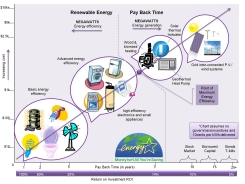Many people still believe that we are naturally entitled to cheap energy, regardless of increasing gasoline costs or the high subsidies for the rising cost of imported heating oil. Every gallon of gasoline offsets the cost of American military guarding the Middle East, trickling subsidies, cheap government land with heavy investment in drilling and developments in exploration technologies. But these costs do not include the damage to health or the environment that come from fossil fuel consumption.
For instance, burning fossil fuel is a major cause of air pollution which shortens the life of about 1,900 Ontarians every year, with innumerable sicknesses and asthma attacks, which cost billions of dollars. Fossil fuels are used in many different ways, including powering vehicles, home heating and electrical power plants. Coal consumption causes about 20% of worldwide CHG emission, but its low financial cost encourages rapid growth in usage, as shown by the possibility of about 130 new power plants on the drawing board.
 America is increasingly dependent on Canada’s oil and gas. However, even Canada – the world’s largest supplier – is using more of its natural gas reserves than it is able to replace with new sources. These reserves declined to a 9-year life as of January 2006, down from 35 years in 1985.
America is increasingly dependent on Canada’s oil and gas. However, even Canada – the world’s largest supplier – is using more of its natural gas reserves than it is able to replace with new sources. These reserves declined to a 9-year life as of January 2006, down from 35 years in 1985.
With increasing demand to sustain America’s domestic consumption, Canada has moved to importing liquefied natural gas, or LNG, to cover the shortfall. But many consider this a foolish decision, as other countries, such as Japan, can easily outbid Canada for LNG with the availability of necessary pipelines. As more and more developing nations connect to the grid, global demand for energy keeps escalating, with more and bigger electrical appliances made easily available via the Internet. This will aggravate the problem further.
Moreover, developed nations’ middle-class populations are increasing their demand for appliances that were considered luxuries a generation ago, such as central air conditioning, computers, multiple refrigerators, chest freezers, swimming pools and hot tubs. The use of more electrical appliances consumes more energy, which in turn impacts climate change.
The World Wide Fund for Nature (WWF) has launched a green program for primary power suppliers to consider green options instead of fossil fuels. The Powerswitch! Program includes major policies and technologies such as:
- energy efficient strategies and management strategies based on demand;
- big offshore wind-energy projects;
- massive co-firing of biomass at current coal power stations;
- more support for those using renewable energies;
- increased aluminum recycling rate;
- to increase combined heat and power systems growth;
- to transit to natural gas from coal.
Nationwide, some of these ideas are very reliable and creative: by switching to a renewable energy system, you can put a smile on your face every time you receive a check from your power utility in the mail.